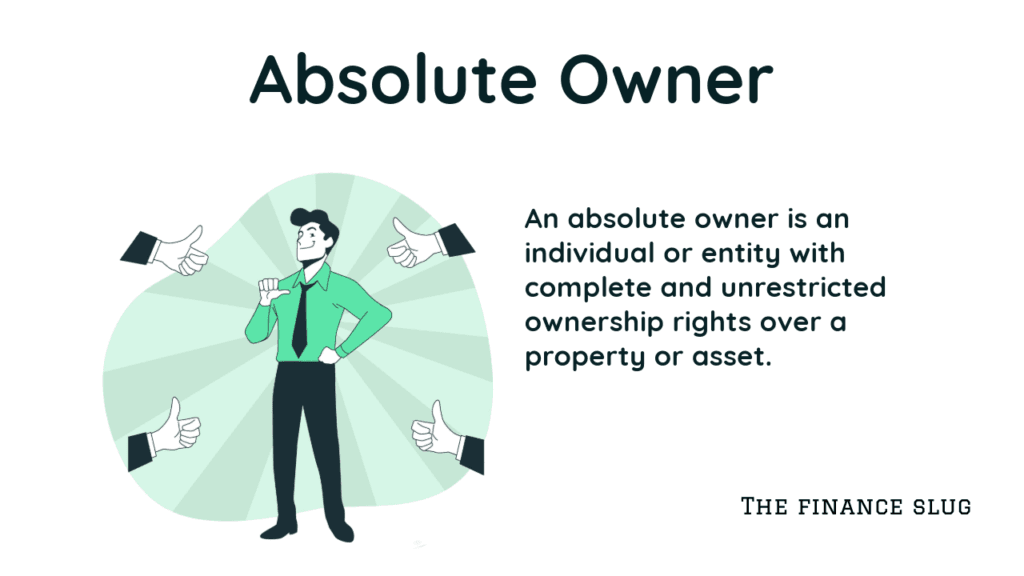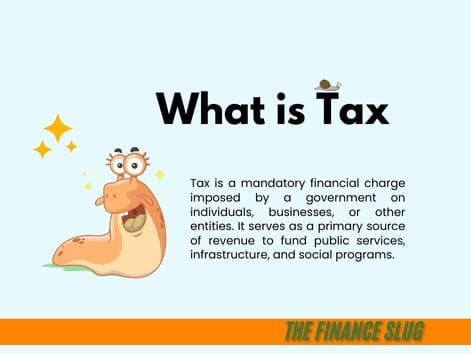
Understanding financial terms is crucial for making informed decisions, especially in property, investments, or legal agreements. One such term is “absolute owner,” commonly encountered in finance and real estate. Absolute ownership is a cornerstone concept that influences legal, financial, and practical decisions. This blog delves into its meaning, implications, advantages, and practical applications to provide a complete understanding.
What is an Absolute Owner?
An absolute owner is an individual or entity with complete and unrestricted ownership rights over a property or asset. This ownership is free from conditions, encumbrances, or limitations, giving the owner full control. For example, if you own a house outright with no mortgage or disputes, you are the absolute owner.
Absolute ownership allows the owner to use, sell, lease, or transfer the asset without requiring consent from others. It ensures the owner has complete authority over their property, a factor that simplifies transactions and boosts confidence in ownership.
Unlike other forms of ownership that might have limitations or conditions, absolute ownership represents the pinnacle of control and freedom. This level of authority not only provides practical advantages but also offers peace of mind to the owner.
Characteristics of Absolute Ownership
Absolute ownership comes with specific characteristics that set it apart. First, it grants complete control and authority to manage the asset. This includes decisions related to usage, improvement, or monetization without requiring third-party involvement.
Another key feature is the absence of encumbrances such as liens, mortgages, or third-party claims. This legal clarity ensures that the owner has an uncontested right to their asset.
Additionally, the ownership is transferable. Whether through sale, inheritance, or gifting, the absolute owner has the freedom to decide how and when to transfer ownership. The title deed or equivalent legal document explicitly reflects this ownership, ensuring no ambiguity.
Finally, absolute ownership guarantees exclusive possession. No other individual or entity can claim rights over the property unless the owner chooses to transfer them.
How Absolute Ownership Differs from Other Types
Absolute ownership is distinct from other types of ownership arrangements. For instance, in joint ownership, rights and responsibilities are shared among multiple parties. Decisions often require consensus, which can complicate matters.
Another comparison is with beneficial ownership, where an individual enjoys the benefits of an asset but may not hold the legal title. Beneficial owners rely on legal owners for decision-making. In contrast, absolute owners hold both legal title and full control, making their ownership more comprehensive.
Leaseholders represent another form of ownership, but they only hold limited rights to use the property for a specific term. Absolute owners, however, enjoy indefinite rights unless they voluntarily transfer or sell the property.
Legal Importance of Absolute Ownership
Absolute ownership holds immense legal significance. It provides a clear title, ensuring there are no disputes or competing claims. This legal clarity is essential for both personal and business transactions, offering peace of mind and reducing risks.
For estate planning, absolute ownership simplifies matters. The owner has the full authority to decide how the asset will be distributed after their lifetime. This avoids complications for heirs and beneficiaries, ensuring a seamless transfer of ownership.
Additionally, assets under absolute ownership can serve as collateral for loans. Financial institutions often favor assets with clear titles, as they reduce the risk of disputes or legal challenges.
In legal disputes, absolute ownership provides a robust defense. Courts typically favor individuals or entities holding absolute ownership titles, provided all documentation is in order. This legal backing makes it a desirable form of ownership.
Benefits of Absolute Ownership
The benefits of absolute ownership extend beyond legal advantages. It grants the owner freedom to make decisions independently, without external interference. This autonomy is especially valuable for personal properties and business assets.
Assets with absolute ownership are often more secure. The absence of disputes or claims enhances their value, making them attractive in the market. Buyers and investors prefer assets with clear titles, as they minimize risks.
In some jurisdictions, absolute owners may enjoy tax benefits, particularly for primary residences or certain types of investments. Additionally, the ability to transfer ownership without conditions provides flexibility for estate planning and gifting.
Absolute ownership also facilitates easier transactions. When selling or transferring the asset, the lack of encumbrances or shared responsibilities simplifies the process. This efficiency saves time and reduces costs, making it a practical choice for many.
Real-Life Examples of Absolute Ownership
Examples of absolute ownership are abundant in everyday life. In real estate, owning a house outright with no pending mortgage or claim reflects absolute ownership. This clarity allows the owner to renovate, sell, or lease the property without restrictions.
Similarly, owning a vehicle outright with no outstanding loan makes you the absolute owner. This ownership gives you the freedom to sell the vehicle, use it as collateral, or even donate it without needing approval.
In investments, absolute ownership is seen when an individual holds shares in a company as the sole shareholder. This grants them full control over decisions related to dividends, voting, and other corporate matters.
Even intellectual property, such as patents or copyrights, can fall under absolute ownership. An inventor or creator holding exclusive rights to their work enjoys the benefits and control associated with absolute ownership.
How to Attain Absolute Ownership
Attaining absolute ownership often requires fulfilling specific conditions. Clearing outstanding liabilities, such as mortgages or loans tied to the asset, is a critical first step. These financial obligations can limit the owner’s control and create potential disputes.
Resolving legal disputes related to the property is equally important. Any unresolved claims or boundary issues can hinder absolute ownership. Engaging legal experts to settle these matters is advisable.
Verifying legal documentation is another essential step. This includes obtaining a clear title deed or ownership certificate. These documents serve as proof of ownership and protect against future disputes.
In some cases, transferring ownership through inheritance or gifting may involve legal formalities. Ensuring compliance with local laws and regulations is necessary to establish absolute ownership.
Limitations of Absolute Ownership
While absolute ownership offers numerous advantages, it is not without limitations. Owners are responsible for complying with local laws, including property taxes and maintenance regulations. Failure to meet these obligations can lead to legal complications.
Additionally, absolute ownership does not protect against external risks. For example, disputes over property boundaries or unpaid dues can still arise. Legal defense and insurance coverage are essential to mitigate these risks.
Absolute owners also bear full liability for debts or obligations tied to the asset. This responsibility requires careful financial planning to avoid unexpected burdens.
Another potential challenge is the value of the asset. While absolute ownership guarantees control, market conditions and external factors can impact the asset’s worth. Owners must stay informed and adapt to changing circumstances.
Why Absolute Ownership Matters
Absolute ownership is more than just a legal concept—it is a foundation for financial security and autonomy. It provides clarity, reduces risks, and empowers individuals to make independent decisions about their assets.
For individuals, absolute ownership ensures that properties and investments remain secure and valuable. For businesses, it offers stability and flexibility, essential for growth and success.
Understanding the concept of absolute ownership is vital for anyone dealing with real estate, investments, or intellectual property. It provides the knowledge needed to navigate financial and legal landscapes confidently.
Whether you are planning to buy a property, invest in assets, or secure your legacy, absolute ownership is a concept worth understanding. It offers not only control and security but also the freedom to shape your financial future.

For more insights into financial terms and concepts, visit Financeslug, your trusted source for finance and business knowledge.

